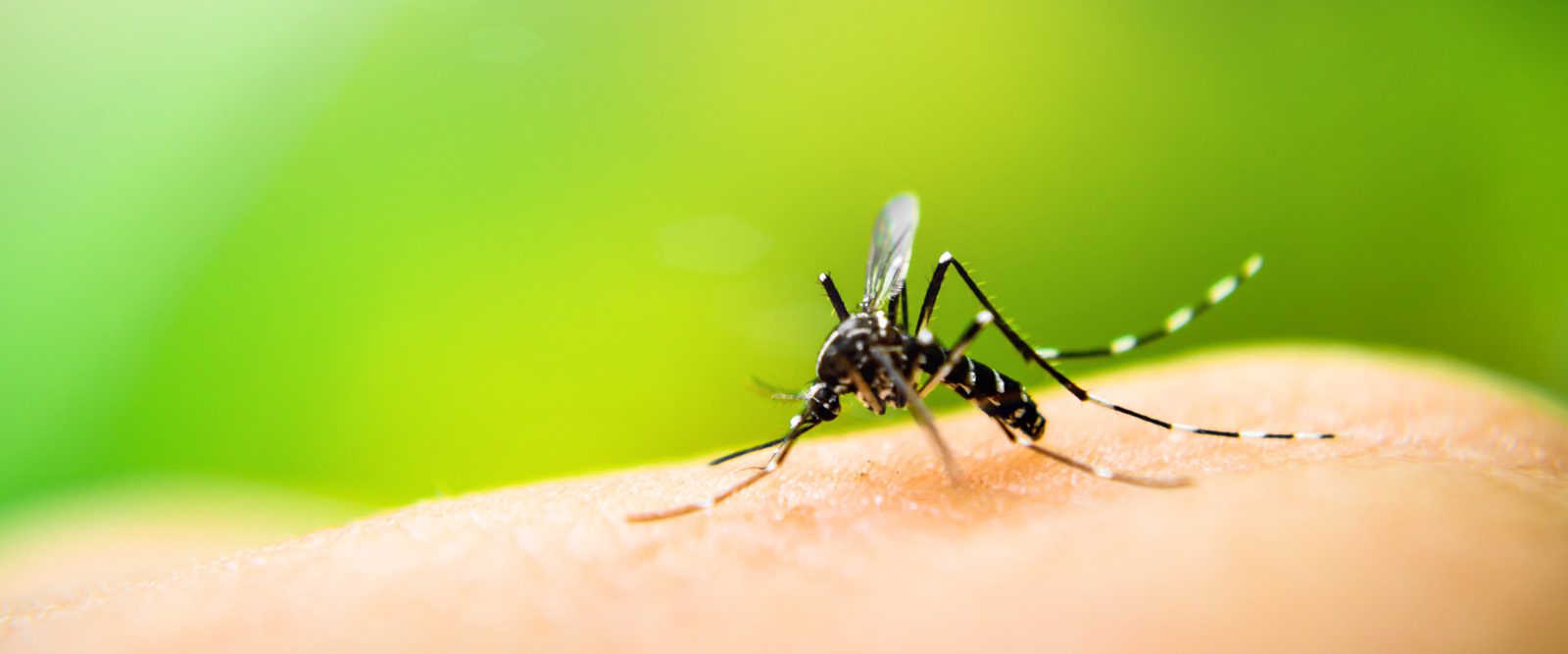Why You Might Be a Magnet for Mosquito Bites
An infectious disease expert explains why mosquitoes bite us and how to keep them away.


Summer is in full swing, and so is mosquito season — the buzzing, the bites, the stinging, and the itching have arrived. While we all try our best to ward off mosquitoes, some people seem to be mosquito magnets. Why are mosquitoes attracted to some people more than others? “There is a lot of buzz around this debate,” says Dr. Laura Kirkman, an infectious disease doctor at NewYork-Presbyterian/Weill Cornell Medical Center. “But scientists are homing in on how scent directs mosquitoes to bite certain people.”
Dr. Kirkman says that it’s important to focus on deterring mosquitoes because bites can be more than a mere annoyance. Every year, cases of West Nile virus are reported across the U.S., and in recent weeks, seven cases of locally acquired malaria have been confirmed in Florida and Texas for the first time in two decades. While strains of malaria have been seen in the U.S. from returned travelers, the cases in Florida and Texas are unique because the people affected had no travel history.
“We used to have a considerable amount of malaria in the U.S. However, in the early 1950s, we were able to eradicate the disease with measures such as draining swamps and the use of insecticides,” says Dr. Kirkman, who focuses her research on the malaria parasite Plasmodium falciparum, which infects people in sub-Saharan Africa. “The species we are seeing in Florida and Texas is one that predominates in most of Latin America, a less virulent type called Plasmodium vivax.”
Dr. Kirkman shared more with Health Matters about mosquito-borne illnesses, as well as why mosquitoes bite, why they are drawn to certain people, and what to do if you get bitten.

Dr. Laura Kirkman
Why do mosquitoes bite?
Dr. Kirkman: It’s an interesting evolutionary question. Mosquitoes need nectar and blood to survive. Male mosquitoes mainly feed on nectar, but females require a blood meal from humans and other mammals, as blood is important for egg development. Ticks are similar. The females are doing most of the hard work to keep the species alive.
So when we look for clues for why mosquitoes are attracted to humans, we mainly study female mosquitoes. Different mosquitoes also have different preferences — some are animal biters, and others prefer us humans.
Are mosquitoes attracted to a person’s body scent?
There is scientific evidence that mosquitoes are drawn to certain chemicals present in human body odor. A significant new study on the African malaria mosquito found that mosquitoes are sensitive to the scent of organic compounds on the skin. The study also found that mosquitoes are repelled by eucalyptol, which is present in a variety of plants we eat (for example, rosemary, sage, and cardamom), toothpaste, and cough medicines.
So do certain body washes or perfumes make a difference?
No, using certain body washes won’t have much of an effect, because the odors mosquitoes are attracted to are natural compounds in the body that create the scent. It’s a blend of molecules we produce that signal, “There’s a warm-blooded meal, and I need to get there.”
Besides scent, what other theories exist for why certain people are mosquito magnets?
It is likely multiple factors, but the most compelling evidence points to organic compounds on our skin and in part due to microorganisms found on or in the human body. There was a study that concluded Type O blood attracts mosquitoes, but it hasn’t really been replicated. Another study found mosquitoes are drawn to specific colors. Even if that were true, I think changing your wardrobe isn’t strong enough to repel mosquitoes. Right now, the general consensus is that it’s body odor that makes certain people “mosquito magnets.”
Is it true that mosquitoes are more attracted to people who are pregnant?
Yes, there is evidence that pregnant people are more likely to get bitten. In fact, one study on African mosquitoes found that pregnant women attracted twice as many mosquitoes compared to their nonpregnant counterparts. The study suggested that it was because pregnant women exhale more carbon dioxide (which happens during pregnancy because the respiratory system changes) and had higher body temperatures. Similarly, people who go out for a run might make more natural compounds that will attract mosquitoes.
Do mosquitoes bite more at different times of day?
It depends on the mosquito. In the New York state area, we have over 70 varieties of mosquito. Some are night biters, some prefer to bite at dawn and dusk, and others will bite you all through the day. Unfortunately, there is always some mosquito looking for a bite, no matter what time of day.
Why do mosquito bites become inflamed and irritated?
When mosquitoes probe around in your skin, they’re putting saliva into your body, and you react to the protein in the saliva. How big the welt is varies from person to person, especially because some people have allergic reactions.
What is the best way to treat a mosquito bite?
Most mosquito bites will swell and itch for a day or two and then get better over time. Try not to scratch them, as you do not want to break the skin. To reduce the swelling, apply an ice pack to the site, and for itching, a mixture of baking soda and water will help, or you can apply an over-the-counter anti-itch or antihistamine cream.
If the welt continues to get bigger, redder, and hot after five to seven days, it could be a sign of a bacterial infection called cellulitis, and antibiotics might be needed to treat it. If you start experiencing other symptoms, such as fever, headaches, or body aches, and you think it might be related to the mosquito bite, call your doctor.
Which repellents do you recommend?
First, before you spray and go outside, consider wearing clothes that will keep the bugs away, like long sleeves or light pants. If you have a baby under 2 months old, you can put mosquito netting or a light blanket over the stroller.
Most of the products you find in the store contain DEET or picaridin. Both are safe to use. The sprays work for ticks as well, so if you live in an area with ticks, it’s doubly beneficial. You can learn more about different repellents through the EPA’s (Environmental Protection Agency) search tool. There’s a lot of fear about repellents, particularly with DEET, but if you don’t apply them when you go outside, you are going to have an increased risk of bug bites. Try to stick to approved repellents on the EPA or CDC websites so that you can have long-lasting protection.
What other advice do you have for reducing risk when it comes to mosquitoes?
Eliminating standing water around your home is a good idea, as it can serve as a breeding ground for mosquitoes.
What to Know About Mosquito-Borne Diseases
While the risk of becoming seriously ill from a mosquito bite in the U.S. is low, it can happen. Here are the most common mosquito-borne illnesses and how to treat them.
Dengue
What is it?
Dengue is one of the most prevalent mosquito-borne diseases worldwide; each year up to 400 million people are infected with dengue virus. Outbreaks in the U.S. have been relatively small and limited and mainly occur in travelers infected elsewhere.
What are the risks?
Dengue causes mild to severe illness and can be a medical emergency. Those at highest risk are travelers to countries with high transmission, infants, and pregnant women. If you have had dengue in the past, you may also be more likely to develop severe dengue.
What are the symptoms?
The most common is fever with nausea, rash, or joint aches. Severe dengue signs appear 24 to 48 hours after the fever is gone and include belly pain, vomiting, or bleeding from the nose or gums.
What are the treatments?
There is no treatment, so take acetaminophen to control fever and relieve pain. Symptoms typically last two to seven days, and most people recover after about a week. If you have symptoms of severe dengue, go to the emergency department immediately.
Malaria
What is it?
Malaria is caused by parasites that are transmitted to humans through bites of a specific kind of mosquito. In 2020, nearly half of the world’s population was at risk of malaria, and the majority of cases and deaths in sub-Saharan Africa.
What are the risks?
Malaria is a serious and potentially life-threatening disease if it is not diagnosed and treated promptly. The groups at higher risks are infants, children under 5, pregnant women, people who are immunocompromised, and travelers coming from areas with high transmission of malaria.
What are the symptoms?
Fever is the most common symptom, along with fatigue, headaches, and nausea. The symptoms of malaria appear around a month after the bite, because the life cycle of the parasite goes through different developmental stages before an infected person has symptoms. More severe symptoms are difficulty breathing, confusion, and seizures.
What are the treatments?
Malaria is treatable. Anyone who has symptoms should see a doctor and take a blood test. Doctors will recommend a treatment based on the type of species of the parasite, symptoms, and travel history. Before going to countries where malaria is present, talk to the doctor about malaria prevention medications.
West Nile Virus
What is it?
West Nile virus is the most common mosquito-borne illness in the U.S. Cases usually appear at the start of the summer and continue through the fall.
What are the risks?
Most people are at a low risk of becoming sick. In rare cases, West Nile can lead to serious illnesses that affect the brain and spinal cord, including encephalitis, meningitis, or acute flaccid paralysis, which is a polio-like syndrome where muscles become weak or paralyzed. The people at highest risk are immunocompromised or older than 60.
What are the symptoms?
Symptoms of West Nile are usually mild to moderate — for example, fever, body aches, or vomiting. They appear within three to 15 days after a bite by an infected mosquito. If the virus becomes more serious, it can cause symptoms like confusion, muscle weakness, or numbness.
What are the treatments?
There is no vaccine or treatment for West Nile, so an over-the-counter medication, like acetaminophen, is the best option for helping to relieve symptoms. A recovery from illness can take weeks, and in serious cases months or longer.
Zika
What is it?
Zika is primarily spread through the bite of infected mosquitoes. It is possible for a pregnant woman to pass Zika to the fetus during pregnancy or birth, and Zika can also be sexually transmitted.
What are the risks?
Most people are at a low risk of becoming seriously ill from Zika. However, an infection during pregnancy can cause birth defects.
What are the symptoms?
Common symptoms are mild, such as fever, rash, headache, and joint pain. They usually last several days to a week.
What are the treatments?
There is no vaccine or treatment for Zika. Over-the-counter medications, such as acetaminophen, can reduce fever and pain.

